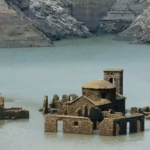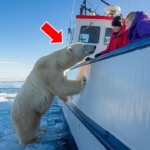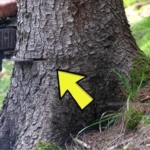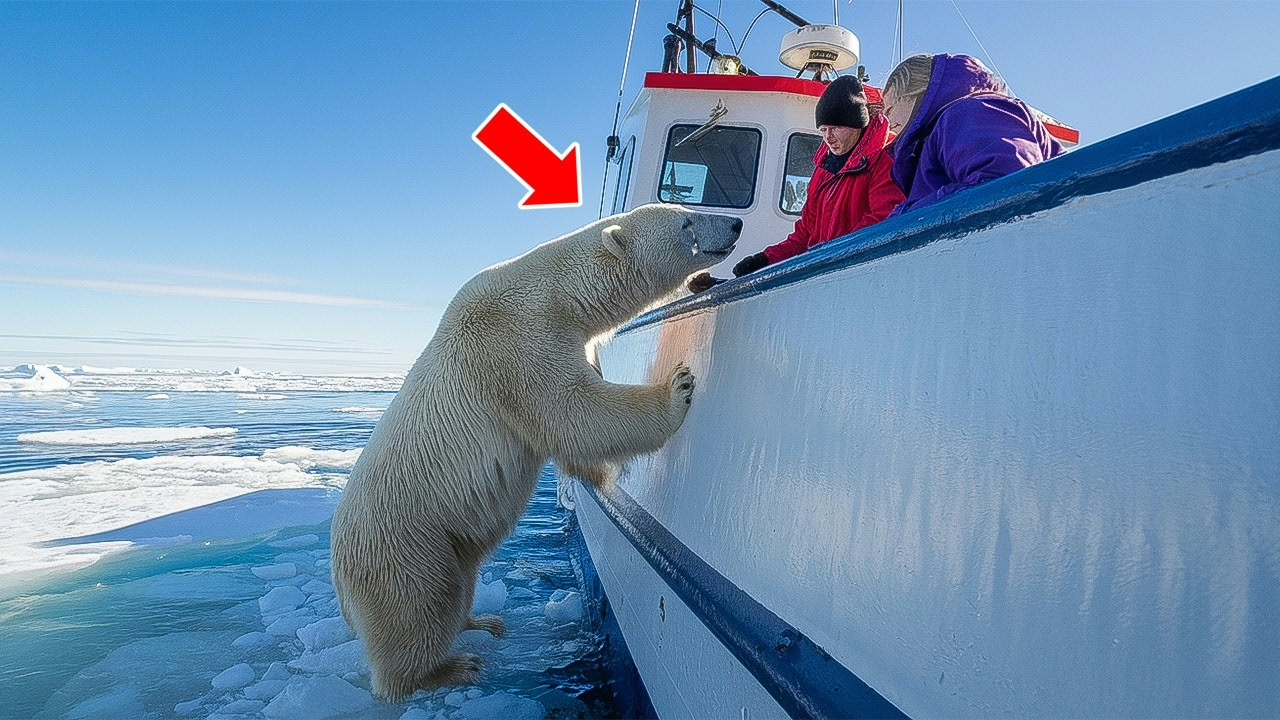The Arctic is a land of contradictions. It is both hauntingly empty and terrifyingly alive, both silent and violent, both a wilderness of ice and an ocean of secrets. Sailors who venture into its fog-choked waters carry with them a deep respect for its power. Some return with stories of storms that tore ships apart, of icebergs that appeared out of nowhere, of nights where the sun refused to set. But rarely do they return with a story like this one — a story of a polar bear that did not hunt, did not threaten, but instead seemed to beckon, to guide, and to demand that they follow.
This is the account of Elias Berg and Captain Henrik Foss, two seasoned seamen aboard a small trawler called Odin’s Mercy. They left port chasing cod and came back with something far stranger: a story of instinct, trust, and a mystery that still leaves more questions than answers.
The Calm Before the Storm
Elias Berg had never trusted still water. At forty-seven, with nearly three decades at sea, he had learned to fear silence more than storms. Storms shouted their warnings; silence whispered promises it could not keep. On that late-season morning in the northern reaches of the Arctic, the water was too calm, the fog too thick, the sky too still.
The Odin’s Mercy, a sturdy but modest fishing vessel, drifted northward, chasing reports of late-season cod migration. For Elias and Henrik, the trip was supposed to be straightforward: two days of nets, full holds of fish, and then a quick run south before the storm predicted to curl in from the barren sea struck their path. Thirty-six hours, maybe less. That was their window.
Henrik Foss, older and broader than Elias, was at the helm. His thick hands moved easily over the wheel, his voice humming a tuneless rhythm that cut through the silence. Henrik was a man who had seen hulls capsize, winches snap, engines burst into fire. Nothing rattled him. His steadiness had been their anchor for years, and Elias trusted him, though he felt unease prickling in his chest that morning.
It was the fog. It was the stillness. It was the way the Arctic sometimes felt like it was waiting for something.
The Ghost Appears
Elias was the first to see it. He had raised his binoculars to scan the curling mist when a shape materialized out of the fog. At first he thought it a drifting floe, but the movement was too deliberate, too smooth. Then it resolved: a bear, its soaked fur clinging to its frame, cutting through the water with steady, purposeful strokes.
“Henrik,” Elias called, his voice low but sharp.
The captain joined him at the railing, his weathered eyes narrowing. Together, they watched the polar bear close the distance.
It was wrong. Polar bears did not approach boats. They hunted seals along the ice, wandered coastlines, sometimes scavenged along whaling stations. But this one swam straight at them, unhesitating, its black eyes fixed.
When it reached the hull, it reared up, water cascading off its fur. One massive paw pressed against the steel. The sound of claws clicking echoed like a signal. It did not roar. It did not snap its jaws. Instead, it looked at them with something Elias had never seen before in an animal’s eyes: intent.
Then it slapped the water sharply with its paw, turned east, swam a few lengths, and paused. The bear looked back at them.
“She wants us to follow,” Elias whispered.
Henrik didn’t hesitate. “Then we follow.”
Into the Ice
The engine rumbled to life. The Odin’s Mercy nosed eastward, weaving through tightening corridors of ice. The fog thickened, and dry flakes of snow began to fall, sharp and stinging. The bear swam ahead, glancing back every few strokes, releasing low, breathy chuffs that sounded almost like signals.
Elias climbed into the wheelhouse, his nerves frayed. “We should turn back. Let Holmes send a research team. We’re not equipped for this.”
Henrik’s knuckles whitened on the wheel. His voice was steady, but his eyes followed the bear. “Look at her. She’s not lost. She’s showing us something.”
Elias cursed under his breath but said no more. He had known Henrik long enough to recognize the stubbornness in his tone.
Behind them, the storm gathered. Ahead of them, the bear swam with unshakable purpose.
The Cry on the Ridge
Suddenly, the bear stopped. She circled a ridge of broken ice, her movements growing frantic. She clawed her way onto a jagged slab and let out a deep, echoing wail that rolled across the water.
“There,” Elias said, pointing. Between two ridges, something stirred.
At first it was just a flicker of movement. Then it became clear: a tiny, furred form wedged into a crevasse. A cub. Its small body trembled, one leg bent wrong, mouth opening silently in weak cries.
Henrik killed the engine. “We’ve got ten minutes before this storm buries us.”
“Then it has to be now,” Elias said.
The Rescue
The skiff splashed into the water. Henrik tossed down rope, cutters, and a heavy wool blanket. Elias was last down the rope ladder, boots slipping, heart pounding.
Ahead, the mother bear stood guard over the cub, her massive frame looming but not advancing. Her growls were low, guttural, but restrained.
They edged the skiff forward until it bumped a slab of ice. Elias and Henrik stepped out carefully, the surface creaking beneath them.
“Caught in a collapse,” Elias whispered, crouching near the crevasse. The cub whimpered weakly, blood streaking the snow.
Henrik unrolled the blanket. “Rope through the back. Lift on my mark.”
Elias eased the rope behind the cub. The moment the cub cried out, the mother stepped forward, her breath steaming, claws scraping ice.
“Easy, girl,” Henrik said, raising his hands. “We’re helping.”
The bear stopped, her eyes locked on theirs. The storm cracked overhead, thunder rumbling closer.
“Now,” Elias hissed.
Henrik pulled. Elias lifted. Muscles strained. With a crack, the cub came free, its small body jerking into Elias’s arms. They wrapped it quickly in the blanket. The mother growled again, deep and guttural, but did not charge.
Step by step, they backed toward the skiff, never turning their backs. The bear shadowed them, a silent sentinel, watching.
Flight Through the Storm
The moment Elias slid into the skiff with the cub, the ice erupted. A groan like a wounded giant echoed as floes shifted and slammed together. Henrik yanked the motor cord. Nothing. He pulled again. The skiff rocked dangerously as waves surged.
“Come on!” Henrik muttered.
At last, the engine coughed to life, and the skiff peeled away from the collapsing ridge. Behind them, the mother bear stood at the edge, her eyes locked on her cub. She released one haunting sound — not a roar, not a growl, but something between a cry and a call — as the storm swallowed her form in the fog.
The Odin’s Mercy loomed ahead, but ice had closed around it. The skiff bounced hard against floes before Elias tied off and scrambled up the rope ladder, the cub clutched against his chest. Henrik followed, drenched and shivering.
“Get us out now!” Elias shouted.
The Waiting
Hours later, through thinning ice and blinding snow, the coastline appeared. A small team waited at the dock. Elias staggered forward, handing the cub over with shaking hands.
“She’s fading,” he said. “Please.”
The team rushed the cub inside. Elias and Henrik stood dripping, silent, and exhausted, watching the storm ease. An hour passed before a woman in a red parka emerged.
Dr. Len Dagsvic of the Arctic Wildlife Unit smiled faintly. “You brought us a miracle.”
Elias leapt to his feet. “Is she—?”
“Dehydrated, cold-shocked, bruised leg. But no fracture. She’ll make it.”
Relief crashed over them. Henrik sat heavily on a crate, shaking his head softly. “No,” he said. “We didn’t find her. She found us.”
The Reunion
The next morning, Dr. Dagsvic returned with footage from a drone sent over the ridge. The monitor flickered with snow and jagged ice. Then a form appeared: the mother bear. She sat waiting.
Moments later, the cub staggered into view, unsteady but alive. The mother rose, her eyes fixed on her offspring. The video cut out just before they touched.
“That’s all we captured,” Dr. Dagsvic said.
Elias nodded slowly, tears pricking his eyes. “That’s good enough for me.”
Reflections in the Ice
In the days that followed, Elias couldn’t stop replaying the encounter. Why had the bear come to them? Was it desperation? Instinct? Something more?
Polar bears are apex predators. They do not seek humans for help. Yet this one had. She had swum to them, shown them the way, and waited for their aid.
Perhaps it was only chance. Perhaps instinct had driven her to act in ways no one could explain. But for Elias and Henrik, the experience had changed everything.
They had come north chasing cod. They returned carrying a story of survival, of trust across species, and of a haunting moment when the Arctic itself seemed to speak through its greatest predator.
Conclusion
The Arctic is not kind. It does not offer mercy. But on that fog-drenched day, amid storm and ice, two sailors glimpsed something extraordinary: a moment of connection in a place where survival is a daily battle.
The cub survived. The mother endured. And the men who witnessed it were left with a story they would never shake — a story of a ghost in the fog, a bear that became a messenger, and a reminder that even in the harshest wilderness, there are mysteries that defy explanation.










